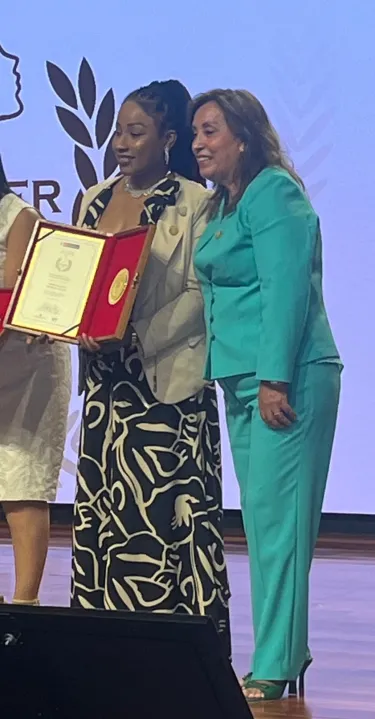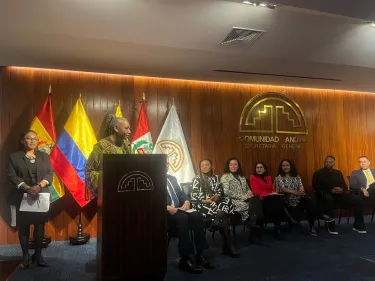On March 6, Narda Mendoza was recognized by the government of Peru for her anti-racism and gender equality work. Mendoza works with Centro de Desarrollo de la Mujer Negra Peruana (the Center for the Development of Black Peruvian Women or CEDEMUNEP), a member organization of the Peru Joining Hands Network and a partner organization of the Presbyterian Hunger Program and several churches of the Presbyterian Church (U.S.A.).
 |
| Dina Boluarte (right), the president of Peru, poses with Narda Mendoza at the ceremony for Peru’s Order of Merit for Women. (Contributed photo) |
“This decoration of the Order of Merit for Women is the highest recognition that the Peruvian state grants to women who stand out for defending and promoting equal opportunities in the country,” Mendoza told the Rev. Jed Koball, a Peru-based mission co-worker of the Interim Unified Agency of the PC(USA). “I feel honored to be part of this community of women who work tirelessly for a more equal and fair future.”
In its 22nd year, the Order of Merit for Women was given to 13 recipients this year. Mendoza was the only one working on behalf of Afro-Peruvian women. Mendoza’s work at the intersection of race and gender and the work of her organization in the understanding of the history and status of Afro-Peruvians have also made her an important partner for the Center for the Repair of Historic Harms in the Interim Unified Agency of the PC(USA).
Ross-Allam met with Mendoza; her colleague, Cecilia Ramírez, director of CEDEMUNEP; and Oswaldo Bilbao Lobaton, director of the Centro de Desarrollo Étnico, to learn how best to support the education and reparations efforts of Afro-Peruvians in naming the historic harms particular to their context and the best process for repair. One outcome of this meeting was the sponsorship of the forthcoming book “Reparaciones y Pueblo Afroperuano — Desarrallando Linea de Base para La Accíon” (“Reparations and Afro-Peruvian People — Developing a Baseline for Action”), for which Ross-Allam wrote the introduction.
“One of the original sociopolitical and ecclesial crimes that Peru shares with the United States,” Ross-Allam writes in the book’s introduction, is that of “conceiving and corrupting a nation born of the union of anti-Blackness and racial capitalism.”
“Reparaciones y Pueblo Afroperuano, therefore, returns to the scene of the original crime and exposes the lines of thought and paths of action that consistently produce unnecessary death, disease, poverty, obstruction, marginalization, and disillusionment for Afro-Peruvian women, men, and children,” Ross-Allam writes.
As director of CEDEMUNEP, Ramírez appreciates the partnership her organization has with the Presbyterian Hunger Program and the Center for the Repair of Historic Harms for the ways that strategic and collaborative alliances allow her and Mendoza to position “our voices, our demands and our contributions as Peruvian people” and as “Afro-Peruvian women empowering ourselves.”
“Our current situations have deep roots and are consequences of colonization and enslavement,” said Ramírez. “These very cruel and painful historical processes have left a very deep mark that continues to this day, and that is evident in the perpetuation of structural and systemic racism and ethnic and racial discrimination.”
“Working in partnership allows us to have the opportunity to unlearn and learn together here we can advance in giving answers not only with respect to the importance of historical reparations but also why, for what, for whom, with whom and how,” Ramírez said.
Beth Waltemath, Communications Strategist, Interim Unified Agency (Click here to read original PNS Story)
Let us join in prayer for:
- Sandra Moon, Ministry Relations Officer, Presbyterian Foundation
- Phillip Morgan, Associate, Music, Theology, Formation & Evangelism, Interim Unified Agency
Let us pray:
Loving God, multiply your gifts within us so that we may share of the bounty of your grace with everyone we encounter today. Amen.


No comments:
Post a Comment